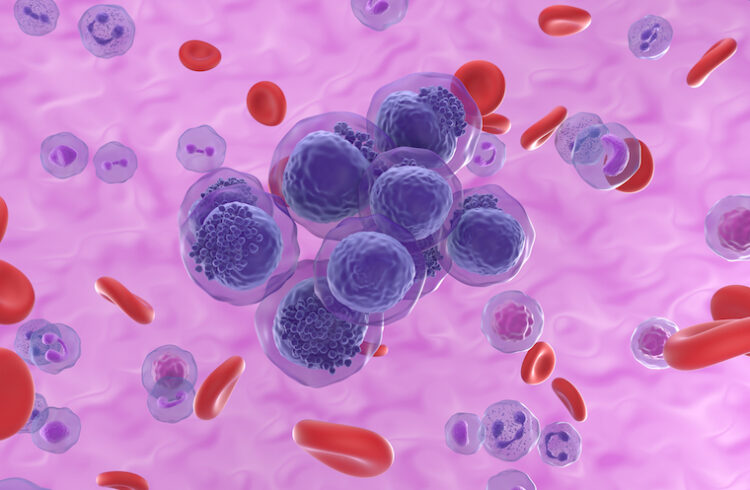
An illustration of acute myeloid leukemia.
Biomedical research that began at the School of Medicine has yielded a much-needed new treatment for patients with the deadliest blood cancer, acute myeloid leukemia.
The federal Food and Drug Administration has approved the drug ziftomenib for patients with recurring or treatment-resistant acute myeloid leukemia who have a mutation in the NPM1 gene. The new medication, taken by mouth once daily, offers a potential treatment for patients who otherwise have no good options.
The drug arose from many years of research by Jolanta Grembecka, PhD, and Tomasz Cierpicki, PhD, who began the work in 2007 as research assistant professors in UVA’s Department of Molecular Physiology and Biological Physics, working closely with John Bushweller, PhD, their former postdoctoral mentor. In 2009, both Grembecka and Cierpicki moved to the University of Michigan, where they are professors in the Department of Pathology.
“Ziftomenib is a long-awaited and desperately needed new option for patients for whom other treatments have failed – for patients left with no hope. It’s a wonderful achievement by Drs. Grembecka and Cierpicki,” said Mark Esser, PhD, the head and chief scientific officer of UVA’s Paul and Diane Manning Institute of Biotechnology. “UVA has founded the Manning Institute specifically to advance exactly this type of important research. We are accelerating the development of new treatment and cures for the most complex and difficult diseases to benefit patients everywhere.”
About Acute Myeloid Leukemia
Acute myeloid leukemia is a particularly deadly blood cancer primarily seen in people over the age of 68. More than 22,000 Americans develop the condition each year, and more than 11,000 die, according to the American Cancer Society. Overall, the disease accounts for about 1 in 3 cases of blood cancer.
“Acute myeloid leukemia is a very aggressive blood cancer with poor clinical outcomes,” Grembecka said. “Seeing our pioneering work on menin inhibitors evolve into an FDA-approved treatment for leukemia patients is extremely rewarding. It is remarkable to witness the direct impact of our research, which resulted in a drug that benefits leukemia patients. This is an achievement we could only dream of, and now it’s a reality.”
Cierpicki and Grembecka’s work at UVA and Michigan produced foundational discoveries that were licensed to Kura Oncology in 2014. The new drug has been developed by collaboration of Grembecka and Cierpicki with Kura Oncology and brought to market under the brand name Komzifti by Kura and pharmaceutical group Kyowa Kirin.
The drug works by disrupting interactions of a cellular protein, menin, that drive leukemia cell growth and survival. It allows cells to mature into white blood cells instead of becoming cancerous.
“To develop menin inhibitors, we had to pioneer an entirely new area of research – producing the human protein, creating robust biochemical assays, conducting high-throughput screening and solving the crystal structure of menin,” Cierpicki said. “We accomplished this at a time when the pharmaceutical industry remained skeptical that targeting protein-protein interactions was even feasible.”
Grembecka and Cierpicki’s collaboration with Kura led to the discovery of ziftomenib, which won FDA approval based on the results of clinical trials that began in 2019. A new treatment option was needed so badly that the federal agency gave ziftomenib a priority review.
“It is immensely gratifying to see the work of Drs. Grembecka and Cierpicki have this amazing impact for patients,” said Bushweller, part of UVA Comprehensive Cancer Center. “Their success portends a future with more such targeted agents and successes that dramatically improve cancer care.”
Ongoing trials are exploring ziftomenib’s potential to work in combination with other treatments to target both leukemia and solid tumors.
“Drug development has traditionally been a long and slow process,” UVA’s Esser explained. “But many patients don’t have time to wait. The Manning Institute is committed to developing new treatments quickly and safely so we can get them to the patients who need them most.”
“It’s always exciting to see UVA research produce important new options such as ziftomenib for patients,” Esser said. “Now we are positioned to make that happen faster.”
About the Research
Grembecka and Cierpicki’s work has been supported by the National Institutes of Health, the American Cancer Society and Blood Cancer United, formerly known as the Leukemia & Lymphoma Society.
The researchers, the University of Michigan and UVA all have a financial interest in ziftomenib.
To keep up with the latest medical research news from UVA, subscribe to the Making of Medicine blog at http://makingofmedicine.virginia.edu.



